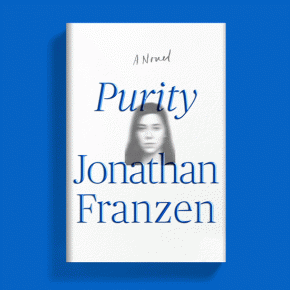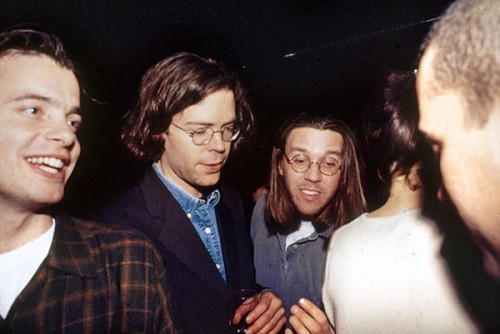
Jonathan Franzen’s new novel, Purity, came out last week, and although it temporarily cost me some good moods and positive self-regard, I got through it. Franzen has a real knack for exposing the ugly personal implications behind most of my daily behaviors. He has a low anthropology, which is partially why his writing is so attractive. Purity includes his take on what the Internet and social media mean for the contemporary self as well as his accurate insights into relationships and family life, achieved so memorably in Freedom and The Corrections. This book gets in your face but also boasts subtle character development and emotional depth. Franzen’s called himself both a lifelong amateur and a literary novelist – a paradox that helps explain how he can effectively combine page-turning seediness with crisp, beautiful writing and incisive cultural critique.
 In “Why Bother?,” an essay released after a falling out with Oprah over featuring Corrections in her book club, Franzen lamented the difficulties facing an ambitious fiction writer. A few passages from the essay shed light on two themes at work in Purity: the Internet and the Ache.
In “Why Bother?,” an essay released after a falling out with Oprah over featuring Corrections in her book club, Franzen lamented the difficulties facing an ambitious fiction writer. A few passages from the essay shed light on two themes at work in Purity: the Internet and the Ache.
In the novel, a Julian Assange-like central character reflects that the Internet resembles a totalitarian regime – “a system that was impossible to get out of.” He goes on:
The old Republic (the Eastern Bloc) had certainly excelled at surveillance and parades, but the essence of its totalitarianism had been more everyday and subtle. You could cooperate with the system or you could oppose it, but the one thing you could never do, whether you were enjoying a secure and pleasant life or sitting in a prison, was not be in relation to it. The answer to every question large or small was socialism. If you substituted networks for socialism, you got the Internet. Its competing platforms were united in their ambition to define every term of your existence.
Sounds like a clever metaphor for the power of technological consumerism and, being attached to my iPhone, I can stomach that. But Franzen’s not done. He has to implicate me as a participant in this regime:
The apparatchiks, too, were an eternal type. The tone of the new ones, in their TED talks, in PowerPointed product launches, in testimony to parliaments and congress, in utopianly titled books, was a smarmy syrup of convenient conviction and personal surrender remembered well from the Republic. He couldn’t listen to them without thinking of the Steely Dan lyric So you grab a piece of something that you think is gonna last.
“Why Bother?” had hinted at these ideas a few years before:
The American writer today faces a cultural totalitarianism analogous to the political totalitarianism with which two generations of Eastern bloc writers had to contend. To ignore it is to court nostalgia. To engage with it, however, is to risk writing fiction that makes the same point over and over: technological consumerism is an infernal machine, technological consumerism is an infernal machine…
 Purity tackles the problems of this totalitarian cultural regime head on and succeeds in avoiding the infernal machine repetition. A main character, the Assange double, fails to get out of his solipsistic hell, retreating instead to massive amounts of pornography and obsessively checking his personal Google alerts. “The caustic descriptions of Andreas’s existential dance with sex and death can feel like Dostoyevsky poured through a comic American filter,” Michiko Kakutani wrote for the NYT.
Purity tackles the problems of this totalitarian cultural regime head on and succeeds in avoiding the infernal machine repetition. A main character, the Assange double, fails to get out of his solipsistic hell, retreating instead to massive amounts of pornography and obsessively checking his personal Google alerts. “The caustic descriptions of Andreas’s existential dance with sex and death can feel like Dostoyevsky poured through a comic American filter,” Michiko Kakutani wrote for the NYT.
The false glimpses of eternity that the Internet seductively flaunts for Franzen contrast with more powerful connections to it in the real world of human interaction. There’s hope in these connections for the characters of Purity. Which leads to a second theme – the Ache. That’s Franzen’s own term, and he presents it in an awesome graph of his essay:
Indeed, we are up against what truly seems like the obsolescence of serious art in general. Imagine that human existence is defined by an Ache: the ache of our not being, each of us, the center of the universe; of our desires forever outnumbering our means of satisfying them. If we see religion and art as the historically preferred methods of coming to terms with this Ache, then what happens to art when our technological and economic systems and even our commercialized religions become sufficiently sophisticated to make each of us the center of our own universe of choices and gratifications? Fiction’s response to the sting of poor manners, for example, is to render them comic. The reader laughs with the writer, feels less alone with the sting. This is a delicate transaction, and it takes some work. How can it compete with a system – screen your calls: go out by modem; acquire the money to deal exclusively with the privatized world, where workers must be courteous or lose their jobs- that spares you the sting in the first place?
“This is a novel of secrets, manipulations and lies,” Colm Toibin wrote in his Purity review. The characters use secrets as a transactional currency in relationships. To share a secret is to forge a bond, however transient, with another person, and, therefore, to combat the Ache. In a couple of memorable passages, we see characters confronting the implications of these transactions.
In the first, a man falls in love with a young girl who’s stuck in an abusive relationship with her step-father. They collaborate to secretly murder him and end the cycle of abuse. The man hopes that the act will provide he and the girl a common ground, a shared history memorable enough to catapult them into a lasting, meaningful relationship. But in jumping to the transactional end of this secret violence, he fails to account for the gravity of taking a life. Here, he’s hit with the weight of what he’s done:
If time was infinite, then three seconds and three years represented the same infinitely small fraction of it. And so, if inflicting three years of fear and suffering was wrong, as everyone would agree, then inflicting three seconds of it was no less wrong. He caught a fleeting glimpse of God in the math here, in the infinitesimal duration of a life. No death could be quick enough to excuse inflicting pain. If you were capable of doing the math, it meant that a morality was lurking in it.
All at once, in a dramatic violent act meant to win over a beautiful girl for life, he’s hit with overwhelming despair, the Ache. The second passage, a reflection on the end of a tumultuous marriage, features a different character who sees the power of real human connection:
I remain convicted that I’ll see her again someday, even if I never see her again. She’s eternal in me. Only once and only because I was very young, could I have merged my identity with another person’s, and singularities like this are where you find eternity.
https://www.youtube.com/watch?v=cRLlYxGNFEc

COMMENTS
2 responses to “The Internet and the Ache in Franzen’s Purity”
Leave a Reply














Thanks for this – fascinating. The technology/totalitarianism theme is so brilliantly developed in Purity, I’m not surprised Franzen has been thinking about it for a long time. This book is an answer to his question, ‘why bother?’ — would like to hear more from you on it – really interesting insights.